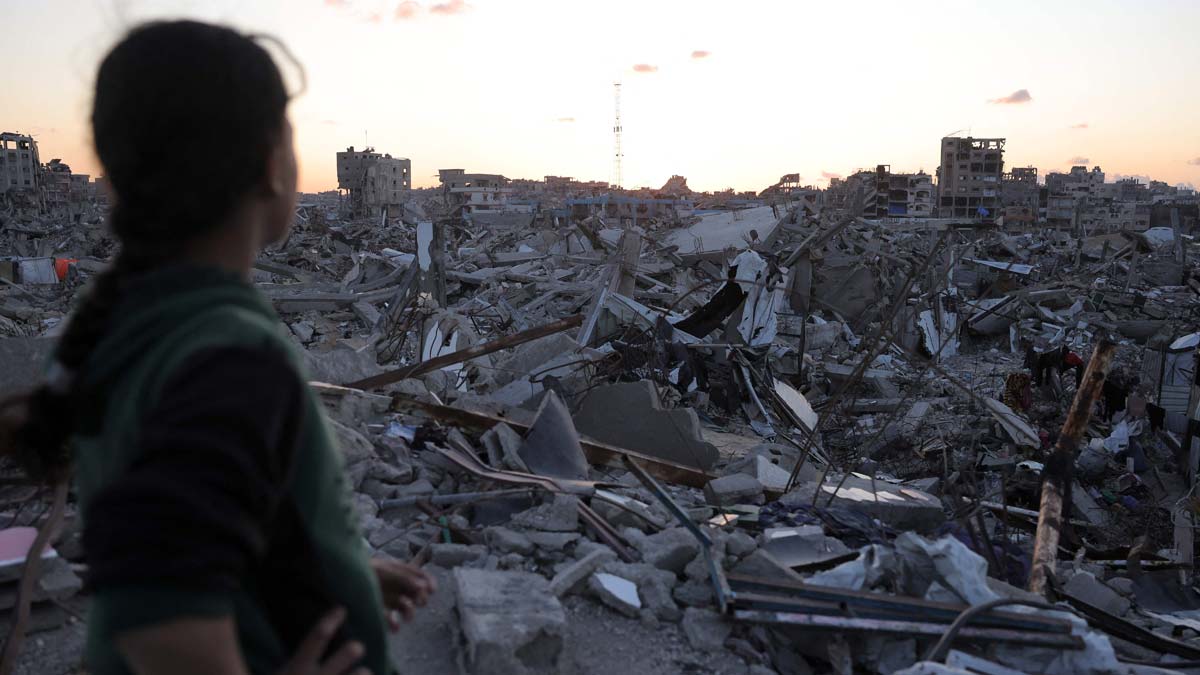‘Unattainable conditions’: Hamas formally rejects Israel's ceasefire offer
 A girl stands amidst rubble in Jabalia in the northern Gaza Strip | AFP
A girl stands amidst rubble in Jabalia in the northern Gaza Strip | AFP
Hamas has formally rejected Israel’s latest ceasefire proposal, calling it inadequate as there is no guarantee of a permanent end to the conflict or a complete withdrawal of Israeli forces from Gaza. Khalil al-Hayya, Hamas’s chief negotiator, made the group’s stand clear via a video message from Qatar, accusing Israeli Prime Minister Benjamin Netanyahu of presenting a deal with “unattainable conditions” that neither halted the war nor ensured a full military exit.
The latest proposal by the Netanyahu government called for complete disarmament by Hamas—a condition the group considers non-negotiable—and offered no assurance of lasting peace, both of which are major sticking points for the Palestinian group.
The Israeli offer also included an initial 45-day ceasefire in exchange for the release of 10 of the 58 hostages held in Gaza since Hamas’s October 7, 2023, attack on Israel. It also included the release of Palestinian prisoners and commitments to discuss ending the war and resuming aid to Gaza.
For the first time, Israel formally insisted on a complete disarmament of Hamas, a demand al-Hayya called a violation of their “fundamental right” to bear arms. The deal outlined a phased release of the remaining hostages, starting with American-Israeli Edan Alexander as a gesture to the United States, followed by nine more hostages in exchange for 120 Palestinian prisoners serving life sentences and over 1,100 detainees held without charge since October 2023.
The Israeli proposal also required Hamas to provide details on surviving hostages in exchange for information about Palestinian detainees, along with the exchange of the remains of 16 deceased Israeli hostages for 160 deceased Palestinians’ bodies. However, Hamas, after days of deliberation, dismissed the offer, reiterating its demand for a comprehensive agreement that ends the war, secures a full Israeli withdrawal, and facilitates a broader prisoner-hostage swap.
A previous ceasefire agreement, concluded in January following pressure from both Donald Trump and Joe Biden, collapsed after its initial phase. Hamas sought to advance to the next stage, which included steps toward a permanent truce, but Israel pushed to renegotiate terms to free more hostages without committing to ending the conflict. When Hamas refused, Israel relaunched its offensive in Gaza last month.
Since then, Israeli military has seized roughly 30 per cent of Gaza, including parts of Rafah, resulting in over 1,600 deaths. Israeli Defence Minister Israel Katz has stated that his troops will maintain “security buffer zones” in Gaza, a stance that contrasts with Hamas’s demand for a complete withdrawal. Following Hamas’s rejection of the truce plan, far right Finance Minister Bezalel Smotrich called for an intensified assault, while Katz vowed to escalate with “immense force” if the hostages were not released. Mediation efforts by Egypt, Qatar and the United States have stalled, with no progress reported in the recent Cairo talks.
Meanwhile, Israel’s blockade on humanitarian aid has triggered a major crisis, described by UN officials as the worst since the war began. The renewed offensive has displaced over five lakh Gazans in under a month, with nearly 1,700 killed since March 18. The UN warns that lifesaving supplies are nearly depleted. With 90 per cent of water infrastructure destroyed, families resort to unsafe water sources.
Major aid organisations operating in the region have warned that Gaza’s humanitarian system faces “total collapse”. Over 2 million people remain trapped in the enclave, with mental health needs surging, infrastructure in ruins and essential services on the verge of failure. The UN Secretary General's spokesperson Stéphane Dujarric highlighted the catastrophic situation, urging immediate action to address the crisis.
Two nights ago, Israeli strikes killed at least 37 people, mostly displaced civilians in a tented camp in al-Mawasi, where Israel had previously directed Palestinians to evacuate. The Israeli military said it was investigating, and claimed recent attacks targeted over 100 “terrorist” sites, including cells and infrastructure. Israel maintains that the blockade pressures Hamas into compliance, with Katz referring to growing tensions between Hamas and Gaza’s population.
The ongoing conflict has heightened concerns for the remaining hostages, particularly after Hamas reported losing contact with the group holding Edan Alexander following an Israeli airstrike. The United States condemned Hamas’s rejection, with National Security Council spokesperson James Hewitt stating that it showed their disinterest in peace. He reiterated the Trump administration’s stance that there would be severe consequences if the hostages are not freed.
Middle East